
The Irish Republican Army was an Irish republican revolutionary paramilitary organisation. The ancestor of many groups also known as the Irish Republican Army, and distinguished from them as the "Old IRA", it was descended from the Irish Volunteers, an organisation established on 25 November 1913 that staged the Easter Rising in April 1916. In 1919, the Irish Republic that had been proclaimed during the Easter Rising was formally established by an elected assembly, and the Irish Volunteers were recognised by Dáil Éireann as its legitimate army. Thereafter, the IRA waged a guerrilla campaign against the British occupation of Ireland in the 1919–1921 Irish War of Independence.
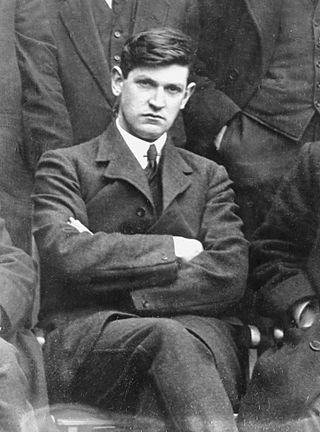
Michael Collins was an Irish revolutionary, soldier and politician who was a leading figure in the early-20th century struggle for Irish independence. During the War of Independence he was Director of Intelligence of the Irish Republican Army (IRA) and a government minister of the self-declared Irish Republic. He was then Chairman of the Provisional Government of the Irish Free State from January 1922 and commander-in-chief of the National Army from July until his death in an ambush in August 1922, during the Civil War.

The Irish War of Independence, also known as the Anglo-Irish War, was a guerrilla war fought in Ireland from 1919 to 1921 between the Irish Republican Army and British forces: the British Army, along with the quasi-military Royal Irish Constabulary (RIC) and its paramilitary forces the Auxiliaries and Ulster Special Constabulary (USC). It was part of the Irish revolutionary period.

Thomas Bernardine Barry, better known as Tom Barry, was a prominent guerrilla leader in the Irish Republican Army (IRA) during the Irish War of Independence and the Irish Civil War. He is best remembered for orchestrating the Kilmichael ambush, in which he and his column wiped out a 18-man patrol of Auxiliaries, killing sixteen men.
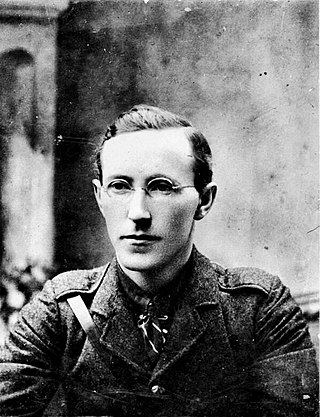
William Fanaghan Lynch was an Irish Republican Army officer during the Irish War of Independence of 1919–1921. During much of the Irish Civil War, he was chief of staff of the Irish Republican Army. On 10 April 1923, Lynch was killed whilst trying to escape an encirclement by Free State troops in south Tipperary.

Thomas Hales was an Irish Republican Army (IRA) volunteer and politician from West Cork.
Liam Deasy was an Irish Republican Army officer who fought in the Irish War of Independence and the Irish Civil War. In the latter conflict, he was second-in-command of the Anti-Treaty forces for a period in late 1922 and early 1923. Before the anti-treaty and pro-treaty split, he was considered closely associated with Michael Collins
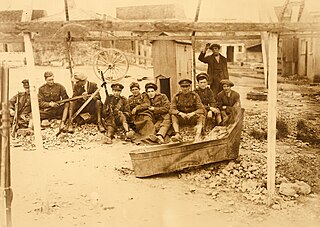
The Irish Free State offensive of July–September 1922 was the decisive military stroke of the Irish Civil War. It was carried out by the National Army of the newly created Irish Free State against anti-treaty strongholds in the south and southwest of Ireland.
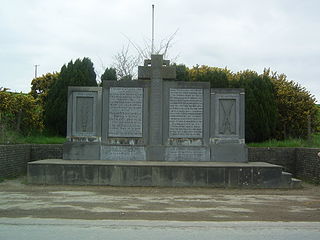
The Crossbarry ambush, also known as the Battle of Crossbarry, occurred on 19 March 1921 and was one of the largest engagements of the Irish War of Independence. It took place near the small village of Crossbarry in County Cork, about 20 km south-west of Cork city. About a hundred Irish Republican Army (IRA) volunteers, commanded by Tom Barry, escaped an attempt by about 1,200 British troops to encircle them. During the hour-long battle, ten British troops and three IRA volunteers were killed.

The Kilmichael ambush was an attack carried out on 28 November 1920 by the Irish Republican Army (IRA) near the village of Kilmichael, County Cork, during the Irish War of Independence. Thirty-six local IRA volunteers commanded by Tom Barry killed sixteen members of the Royal Irish Constabulary's Auxiliary Division. The Kilmichael ambush was politically as well as militarily significant. It occurred one week after Bloody Sunday and marked an escalation in the IRA's campaign.
Daniel "Sandow" O'Donovan, was a leading member of the Irish Republican Army during the Irish War of Independence.
Charles Hurley was Officer Commanding of the 3rd Cork Brigade of the Irish Republican Army during the Irish War of Independence (1919–1921)
Edmund Lenihan, known as Eddie Lenihan, is an Irish author, storyteller, lecturer and broadcaster. He is one of the few practising seanchaithe remaining in Ireland. He has been called "one of the greatest of Irish story-tellers", "a national treasure" and an "absolute legend."
Liam Pilkington, also known as William Pilkington and Billy Pilkington, was a member of the IRA during the Irish War of Independence. Pilkington was General Officer Commanding (GOC) of the 3rd Western Division, IRA, from 1921 to 1923. After the conclusion of the Irish War of Independence Pilkington joined the Anti-Treaty IRA during the Irish Civil War. He attempted to become a politician for a short while, but was ultimately unsuccessful. Disillusioned due to the Irish Civil War, Pilkington became a Catholic priest for the remainder of his life. He served as a priest in South Africa and Wales before retiring to Liverpool, England, where he died.
The Dunmanway killings, also known as the Bandon Valley Killings, the Dunmanway murders or the Dunmanway massacre, refers to the killing of fourteen males in and around Dunmanway, County Cork and Bandon Valley, between 26–28 April 1922. This happened in a period of truce after the end of the Irish War of Independence and before the outbreak of the Irish Civil War in June 1922. The massacre became a matter for historical controversy and debate following the publication of Peter Hart's book The IRA and its Enemies in 1998. Of the fourteen dead and missing, thirteen were Protestants including one Methodist and one was Roman Catholic, which has led to the killings being described as sectarian. Six were killed as purported British informers and loyalists, while four others were relatives killed in the absence of the target. Three other men were kidnapped and executed in Bandon as revenge for the killing of an IRA officer Michael O'Neill during an armed raid. One man was shot and survived his injuries. Recent evidence confirms that the killings were carried out by unnamed local IRA members.

Denis Barry was an Irish Republican who died during the 1923 Irish hunger strikes, shortly after the Irish Civil War.
The 3rd Cork Brigade, also known as Third (West) Cork Brigade, was a unit of the Irish Republican Army that operated in the western areas of County Cork during the Irish War of Independence. The unit was commanded by Tom Barry for most of the conflict and was responsible for the Kilmichael Ambush and Crossbarry Ambush. Charlie Hurley took command of the brigade during Tom Barry's illness in 1920.
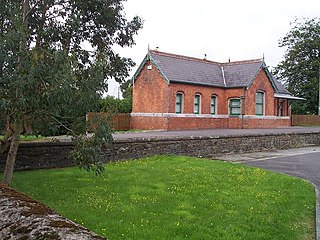
The Upton train ambush took place on 15 February 1921, during the Irish War of Independence. The Irish Republican Army (IRA) mounted an attack on a train carrying British soldiers at Upton, County Cork. The action was a disaster for the IRA; three of its volunteers were killed, two wounded and one captured. Six British soldiers were wounded, three seriously. At least eight civilian passengers were killed and ten wounded in the crossfire.

The guerrilla phase of the Irish Civil War began in August 1922, when the forces of the Irish Free State took all the fixed positions previously held by the Anti-Treaty IRA. The IRA then waged a guerrilla war to try to bring down the new Irish Government and overturn the Anglo-Irish Treaty. This guerrilla campaign was ultimately defeated.

Leslie Mary de Barra was an Irish nationalist and republican active during the Easter Rising of 1916, the War of Independence and the Civil War, becoming Director of Cumann na mBan. She went on to be chairman and President of the Irish Red Cross.













